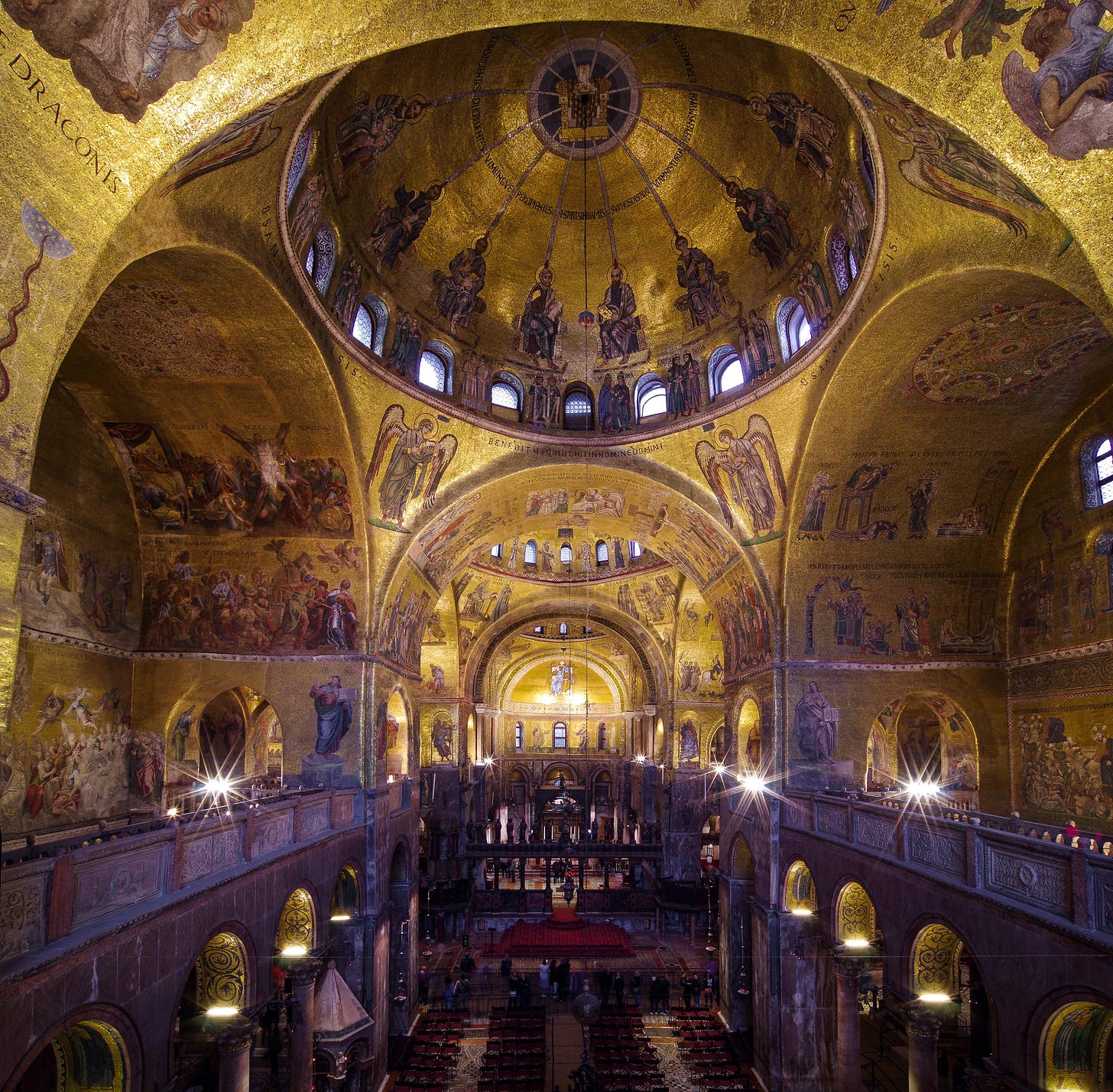We continue our journey along Claudio Monteverdi’s life and get to know him better. Last week, we learnt of Monteverdi’s carefully metered ambition and ability to use his reputation to secure a higher position. We also wept with him over the death of his wife and of Caterina Martinelli, the young singer whom he helped raise and educate. Now, we follow Monteverdi’s move from Mantua to Venice.
If you are a new reader, please read this post to learn more about myself and this publication.
Monteverdi’s employer, Duke Vincenzo Gonzaga of Mantua, died on 18 February 1612. His twenty-six-year-old son, Francesco, succeeded him. Monteverdi had dedicated his 1607 opera L’Orfeo to the then-prince, and in March 1612, Francesco even wrote a letter of recommendation for Monteverdi’s son thanks to his father’s loyal service: “for the honorable service which he does us and for the merit of his presence we wish him every convenience…” Yet, the stalwart composer’s two decades of service would not prevent him and his younger brother Giulio Cesare Monteverdi from being dismissed just months later, in July. A likely explanation is that the new duke was cutting costs to his court. Monteverdi’s colleague, the nobleman Alessandro Striggio the Younger, wrote of him:
“So far from the truth it is that Monteverdi left this city with little honor, that indeed he was honored in the extreme by knights, and as well regarded and cherished as possible, and his works are sung here with great praise in the most distinguished salons.”
After spending a year in his native Cremona, Monteverdi auditioned for and secured the eminent position of maestro di cappella (director of music) at St Mark’s Basilica in Venice in August 1613. The position came with many responsibilities and a steady pay. Monteverdi had dealt with the former at Mantua but not received the latter; he would petition Mantuan officials for unpaid wages until the last year of his life.

Monteverdi’s letters, travels, and compositions from around the time he was let go suggest that he might have been seeking to leave Mantua anyway. In 1610, he had published the magnificent Vespers of the Blessed Virgin, a collection of liturgical music which he dedicated to Pope Paul V. Part of the dedication reads,
“…and so that the mouths of Claudio’s wicked detractors might be closed, I bring and offer at Your most holy feet these things of mine, such as they are, the fruits of my nocturnal labor.”
This is language typically used for patrons. Moreover, Monteverdi had made a trip to Rome soon after the September 1610 publication in Venice, where he had met a few cardinals and potentially had a papal audience. However, a job in the papal choir hade not worked out, and Monteverdi had found himself back at Mantua. The Vespers did help him secure his position at Venice three years later, though, since the authorities at St Marks’s had considered not only his audition, but also past music published. That the Vespers contained many veiled homages to Venice helped even more. Could Monteverdi have been playing the long game, then, by going through the publication process?
Consider next his financial situation. With two young boys to raise and the above-mentioned difficulties in procuring his wages, Monteverdi’s letter-writing for advancement grows even greasier. In 1611, he wrote to Cardinal Ferdinando Gonzaga (duke Vincenzo’s second son), praising the cardinal’s own music and requesting a pension for his musician-in-training son:
“Dear Sir, help me if possible through your boundless grace, acting, in doing me this favor, more in accord with your infinite kindness than with my merits; for I know full well that there is nothing in me that does not spring from your infinite goodness…”
Monteverdi was savvy to keep his relationship with the Gonzaga as close as possible. Even later from Venice he would write to old colleagues in Mantua and accept and request commissions for secular music for the Mantuan court. Cardinal Ferdinando, who would later become duke, was often a benefactor.
Monteverdi’s final move to Venice was in October 1613. En route, near Sanguinetto, three robbers set upon the composer, who was travelling with his thirteen-year-old son Francesco and a maidservant. He wrote in immense detail about how the highwaymen had used an armed musket and robbed him of “more than a hundred Venetian ducats in money and effects.” Monteverdi also suspected the Mantuan courier accompanying him of being in on the plan, especially because nothing of his was taken, and that he put his arm in a sling the next day on pretext of injuries sustained during the robberies, despite even being touched by the brigands. While not all details line up precisely, the letter betrays righteous indignation, annoyance, and helplessness on Monteverdi’s part– this incident had shaken him up. Moving two young boys to another city was no mean feat in 1613. He wrote in desperation,
“I have told the Lord President all about my misfortune, and although he is kindness itself I should be extremely grateful if you would be good enough to have a word with him on my behalf, for I am very greatly in need…”
Poor Monteverdi. His Mantuan chapter ended just as stressfully and unfairly as it had lasted. Luckily for him, the three decades he would spend in Venice would be more fruitful, happier, and more stable. Monteverdi’s fame and reputation grew even further, and for the most part, he commanded respect and admiration. More on his Venetian adventures next week.
Music Referenced here:
References
Arnold, Denis and Nigel Fortune. “The Monteverdi Companion.” London: Faber, 1968.
Fabbri, Paolo. “Monteverdi.” Translated by Tim Carter. Cambridge: Cambridge University Press, 1994. doi:10.1017/CBO9780511627279.
Whenham, John. “Monteverdi: Vespers (1610)”. Cambridge Music Handbooks. Cambridge: Cambridge University Press, 1997. doi:10.1017/CBO9780511620119.
Of Musicians and Cantors is a reader-supported publication. To receive new posts and support my work, consider becoming a free or paid subscriber.





